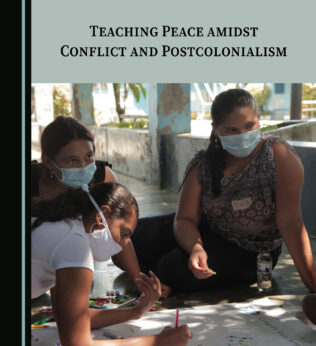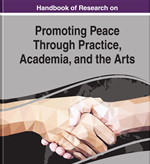Publications
“Innovative publications on peace education”
Learn about our upcoming book
Mainstreaming peace education in educational systems worldwide is one of EGP’s main goals. Building on this objective, we are currently conducting research on how peace education is being implemented in several countries. To provide a broad perspective, the analysis focuses on top-down and bottom-up efforts on this regard.
We hope that findings from the cases studied serve as valuable inputs for educators and practitioners of the field, as well as for decision-makers. The ultimate intention is that peace education efforts continue to be improved and adopted by many countries.
The research for this book will also be a basis for the creation of a Global Peace Education Index (GPEI) - rank state and societies (Institutions, schools and organizations) level of implementation of peace education in school systems in a yearly report. The metrics for the ranking will be developed in consultation with an international panel of peace education experts.
Some of the questions to be answered are:
- How does a particular state define peace education (if there is such) and what are the major elements of peace education (in that particular country)?
- Does the state have any institutional structures devoted to peace education?
- Are there non-state actors initiatives on peace education?
- What is the relationship between state (or any of its jurisdictions, institutions, or agencies) and non-state actors regarding peace education?
- Are there any other challenges or actors in the society which are serving as hindrance to peace education?
- What can be learned and what can be improved?
Teaching Peace amidst Conflict and Postcolonialism
Description:
In a world where post-conflict and postcolonial countries struggle to heal from the past and meet new challenges, peace education is often neglected and instrumentalized for political agendas. Drawing on case studies from Afghanistan, Bolivia, Burundi, Colombia, Myanmar, Nepal, New Zealand, Northern Ireland, Sri Lanka, and Uruguay, this book shows that cultural and structural violence can, in turn, lead to direct violence.
An effective program of peace education responds to these dynamics meeting our urgent problems and opening up new opportunities for peacebuilding. With this direction in mind, this book addresses the practices of peace education from around the world. The fundamental question answered here is: can peace be taught, especially where the scars of war and legacies of colonialism are entrenched in society? Peace education is foundational to a more equitable future where global citizens share a planet in justice, equity, with human security, and all the elements of sustainable, resilient peace. Foremost, it is an essential pillar for societies scarred by violence.
More details and to purchase -->

Handbook of Research on Promoting Peace Through Practice, Academia, and the Arts
Description:
Academic disciplines perceive tranquility and a sense of contentment differently among themselves and therefore contribute to peace-building initiatives differently. Peace is not merely a function of education or a tool that produces amicable systems, but rather a concept that educational contributions can help societies progress to a more peaceful existence.
The Handbook of Research on Promoting Peace Through Practice, Academia, and the Arts aims to provide readers with a concise overview of proactive positive peace models and practices to counter the overemphasis on merely ending wars as a solution. While approaching peace-building through multiple vantage points and academic fields such as the humanities, arts, social sciences, and theology, this valuable resource promotes peace-building as a cooperative effort. This publication is a vital reference work for humanitarian workers, leaders, educators, policymakers, academicians, undergraduate and graduate-level students, and researchers.
More details and to purchase -->
The many academic areas covered in this publication include, but are not limited to:
- Boone-Kabul Project
- Gendered Perspective of Peace
- International Governance Systems
- Peace Culture
- Peace Education
- Religious Peace
- Science of Peace
- Sustainability

Get In Touch
If you want to learn more about this project, do not hesitate to contact our project coordinator!
Research leaders:
Michael Minch
Sadaf Taifur
Project collaborators:
EGP Leadership Board
